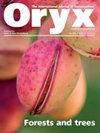Exploring links between socio-ecological systems and psychological distress: a case study in rural Uganda
IF 2.1
3区 环境科学与生态学
Q2 BIODIVERSITY CONSERVATION
引用次数: 0
Abstract
Poor mental health is a leading contributor to the global burden of disease but there is poor understanding of how it is influenced by people's interactions with ecological systems. In a theory-generating case study we asked how interactions with ecosystems were perceived to influence stressors associated with psychological distress in a rural setting in Uganda. We conducted and thematically analysed 45 semi-structured interviews with residents of Nyabyeya Parish. Poverty and food insecurity were the primary reported causes of ‘thinking too much’ and related idioms suggesting psychological distress. Households bordering a conservation area reported that crop losses from wildlife contributed to food insecurity. However, forest resources represented important safety nets for those facing poverty and food insecurity. Commercial agricultural expansion also emerged as a salient theme in the lives of residents, reportedly exacerbating poverty and food insecurity amongst poorer households but contributing incomes to wealthier ones. Our exploratory study suggests how two globally prevalent land uses, nature conservation and commercial agriculture, may influence social determinants of psychological distress in the study area. We highlight co-benefits and trade-offs between global sustainability goals that could be managed to improve mental health.探索社会生态系统与心理困扰之间的联系:乌干达农村案例研究
心理健康状况不佳是造成全球疾病负担的一个主要因素,但人们对人们与生态系统的互动如何影响心理健康却知之甚少。在一项产生理论的案例研究中,我们询问了在乌干达的一个农村环境中,人们如何看待与生态系统的互动对与心理困扰相关的压力因素的影响。我们对 Nyabyeya 教区的居民进行了 45 次半结构化访谈,并对访谈内容进行了专题分析。据报告,贫困和粮食不安全是导致 "想太多 "和相关成语暗示心理困扰的主要原因。与保护区接壤的家庭报告说,野生动物造成的作物损失导致了粮食不安全。然而,森林资源对于那些面临贫困和粮食不安全的人来说是重要的安全网。据报道,商业性农业扩张加剧了贫困家庭的贫困和粮食不安全,但却为富裕家庭带来了收入。我们的探索性研究表明,自然保护和商业性农业这两种全球普遍的土地利用方式会如何影响研究地区心理困扰的社会决定因素。我们强调了全球可持续发展目标之间的共同利益和权衡,这些目标可以通过管理来改善心理健康。
本文章由计算机程序翻译,如有差异,请以英文原文为准。
求助全文
约1分钟内获得全文
求助全文
来源期刊

Oryx
环境科学-生态学
CiteScore
5.30
自引率
7.40%
发文量
150
审稿时长
18-36 weeks
期刊介绍:
ORYX—THE INTERNATIONAL JOURNAL OF CONSERVATION, a quarterly journal from Fauna & Flora International, publishes research on biodiversity conservation, conservation policy and sustainable use, and the interactions of these matters with social, economic and political issues. The journal has a particular interest in material with the potential to improve conservation management and practice. Explore the map for details of published articles.
 求助内容:
求助内容: 应助结果提醒方式:
应助结果提醒方式:


